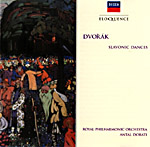Antal Dorati really gets into the spirit of Dvorak’s Slavonic Dances, as well he might: this is his third (!) complete recording of them. These are very exciting, vibrant renditions, which is not to say that he plays everything fast and loud. In fact, the more relaxed sections are wonderfully heartfelt. Dorati the ballet conductor is evident in the clever but tasteful rubato he employs in every dance. While Royal Philharmonic has nothing like an authentic Czech sound (as does the Czech Philharmonic on its fabulous recording with Vaclav Neuman on Canyon Classics), Dorati does have them fully responding to the style of the music. The strings play Dvorak’s irresistible melodies, like op.72 no.2, with a wonderful singing quality. Dorati’s tempo for this, and the other ‘slow’ dances, is flowing and slightly faster than usual. Throughout we get the sense that the orchestra is clearly having a good time (the Op.72 no.7 is over the top with enthusiasm). Decca’s recording has plenty of impact, clarity and depth, though with a trace of harshness imparted by the early digital technology. Another fine bargain from Eloquence.
































